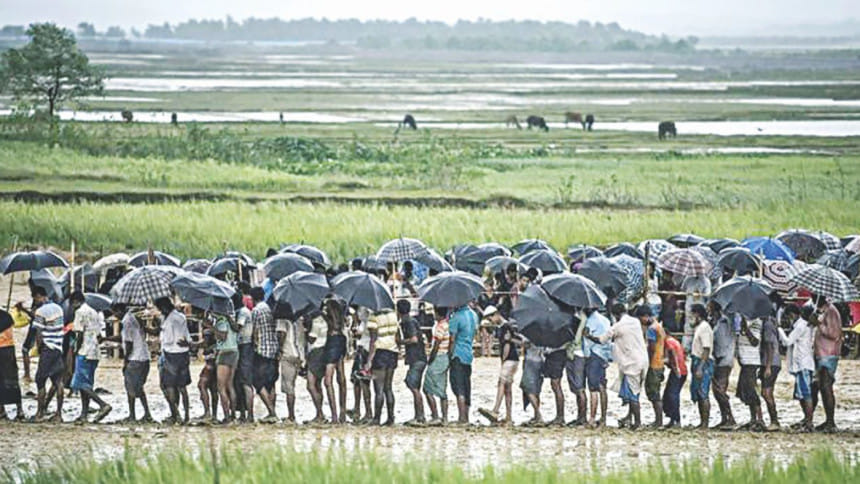Dhaka, Ottawa and The Hague: Rohingya Convergence

On April 4, 2018, the Canadian prime minister's special envoy to Myanmar, Bob Rae, released a report entitled "Tell them we're human: What Canada and the world can do about the Rohingya crisis." The report investigates the humanitarian crisis as a result of the recent exodus of Rohingya refugees from Myanmar into Bangladesh. It focuses on four themes: the need to combine principle and pragmatism in responding to the serious humanitarian crisis in both Myanmar and Bangladesh; the ongoing political challenges in Myanmar; the strong signals that crimes against humanity were committed in the violent displacement of more than 671,000 Rohingya from Rakhine State in Myanmar; and finally, the clear need for more effective coordination of both domestic and international efforts.
Just a few hours before its release, the Dhaka Declaration was announced on April 3, which came out of the two-day international conference "Rohingya Refugee Crisis: Towards Sustainable Solutions." It was jointly organised by ActionAid Bangladesh, the Centre for Genocide Studies of University of Dhaka, and the Centre for Peace and Justice of BRAC University. The conference brought together academics, development practitioners, human rights activists, climate change experts, sociologists, economists, political analysts and journalists from various countries such as, Australia, China, India, Myanmar, the Netherlands, Singapore, Thailand, UK and US. Md Shahidul Haque, foreign secretary of the government of Bangladesh, and Dr Gowher Rizvi, international affairs advisor to the prime minister, made strong unequivocal statements on Bangladesh's position. The participants spoke on varied issues such as refugee policy and rights, voluntary repatriation, geopolitical dynamics, and protection and needs of Rohingya women and girls. The conference explored peaceful and sustainable solutions of the Rohingya crisis. The Dhaka Declaration is, therefore, the collective voice of the participants and was endorsed by the conference.
Upon reading both documents it became evident that Bob Rae and the authors of Dhaka Declaration share similar beliefs and principles. The fundamentals and recommendations of both documents are based upon the preamble of Dhaka Declaration that "human rights are universal….They exist in all human beings, without discrimination…They cannot be taken away by cunning or sophistry…." Bob Rae states that "Canada should signal willingness to welcome refugees from the Rohingya community in both Bangladesh and Myanmar, and should encourage a discussion among like-minded countries to do the same. This in no way lessens the obligations of the Government of Myanmar to accept responsibility for the departure in such violent circumstances of the Rohingya population from their homes."
The documents also recommend that perpetrators of ethnic cleansing and genocide must face justice and be held accountable. The need for comprehensive investigation of acts of genocide in Myanmar and the need to prosecute the offenders responsible for crimes against humanity have been consistently emphasised. The Dhaka Declaration obliges the international community to extend support and recognises the contribution of the government of Bangladesh as well as the host communities. The latter have undergone social and economic impact, and the Declaration "….calls upon Myanmar and the international community to address the issues of loss and damage."
Both documents also address gender issues as women have suffered horrific circumstances and have been victims of abuse and sexual violence as a weapon of war. The authors share the same views and compel the international community to investigate these crimes against humanity. Bob Rae emphasises the need for post-traumatic measures to help those who have survived this ordeal. The Dhaka Declaration highlights "….the need to constructively build on the strengths of the Rohingya population, particularly women…."
On April 9 another very significant development took place at The Hague. The Chief Prosecutor of the International Criminal Court (ICC) made an application "seeking a ruling under article 19(3) of the Rome Statute on whether the Court may exercise jurisdiction under article 12(2)(a) of the Statute over the alleged deportation of the Rohingya people from Myanmar to Bangladesh." On April 11 the ICC gave its unequivocal decision after considering the following test: regulation 46(3) of the Regulations requires the President of the Pre-Trial Division to direct the matter, request or information to a Pre-Trial Chamber "as long as the subject-matter [….] pertains to an issue that does not appear (a) to fall outside the competence of the Pre-Trial Chamber, or (b) to be manifestly frivolous." In paragraph 3 of the short judgment the decision reads, "Without any prejudice to the determination by the competent Pre-Trial Chamber, the President of the Pre-Trial Division is of the view that the matter raised in the Request fulfills the above criteria."
The final outcome of this legal process is hard to predict but suffice to mention that the ICC has taken cognisance of the Rohingya issue and the proverbial train has left the station. The Dhaka Declaration "calls upon the international community to comprehensively investigate the ongoing acts of genocide, mass atrocities, crimes against humanity and ethnic cleansing in Myanmar, and demand the prosecution and punishment of those offenders responsible for such violations, and protect the Rohingya from further harm." This will require strenuous and sustained diplomatic effort, and Bangladesh will have to lead this process as it did with the herculean humanitarian campaign since August 2017. A sustainable solution of the Rohingya crisis will require convergence of thoughts and processes as exemplified by recent events in Dhaka, Ottawa and The Hague.
Manzoor Hasan, Barrister-at-Law, is the executive director of the Centre for Peace and Justice, BRAC University. Syeda Jaferi Husain assisted in the writing of this article. The opinions expressed herein are those of the authors and do not purport to reflect the opinions or views of the organisation(s) they represent.

 For all latest news, follow The Daily Star's Google News channel.
For all latest news, follow The Daily Star's Google News channel. 



Comments